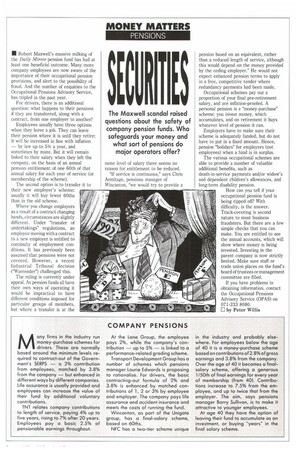ECOR I T I E The Maxwell scandal raised questions about the safety of
Page 41

If you've noticed an error in this article please click here to report it so we can fix it.
company pension funds. Who safeguards your money and what sort of pensions do major operators offer?
• Robert Maxwell's massive milking of the Daily Mirror pension fund has had at least one beneficial outcome. Many more company employees are now aware of the importance of their occupational pension provisions, and alert to the possibility of fraud. And the number of enquiries to the Occupational Pensions Advisory Service, has tripled in the past year.
For drivers, there is an additional question: what happens to their pensions if they are transferred, along with a contract, from one employer to another?
Employees usually have three options when they leave a job. They can leave their pension where it is until they retire; it will be increased in line with inflation — by law up to 5% a year, and sometimes by more. But it will remain linked to their salary when they left the company, on the basis of an annual pension entitlement of one 60th of that annual salary for each year of service (or membership of the scheme).
The second option is to transfer it to their new employer's scheme: usually it will buy fewer 60ths than in the old scheme.
Where you change employers as a result of a contract changing hands, circumstances are slightly different. Under "transfer of undertakings" regulations, an employee moving with a contract to a new employer is entitled to continuity of employment conditions. It has previously been assumed that pensions were not covered. However, a recent Industrial Tribunal decision ("Warrender") challenged this, The ruling is currently under appeal. As pension funds all have their own ways of operating it would be impractical to have different conditions imposed for particular groups of members, but where a transfer is at the pension based on an equivalent, rather than a reduced length of service, although this would depend on the money provided by the ceding employer." He would not expect enhanced pension terms to apply in a free, competitive tender where redundancy payments had been made.
Occupational schemes pay out a proportion of your final pre-retirement salary, and are inflation-proofed. A personal pension is a "money-purchase" scheme: you invest money, which accumulates, and on retirement it buys whatever level of pension it can.
Employers have to make sure their scheme is adequately funded, but do not have to put in a fixed amount. Hence, pension "holidays" for employers (not employees) when a fund is in surplus.
The various occupational schemes are able to provide a number of valuable additional benefits, such as death-in-service payments and/or widow's and dependent children's allowances, and long-term disability pension.
How can you tell if your occupational pension fund is being ripped off? With difficulty, is the answer. Track-covering is second nature to most business fraudsters. But there are a few simple checks that you can make. You are entitled to see the annual accounts, which will show where money is being invested. Investing in the parent company is now strictly limited. Make sure staff or trade union places on the fund's board of trustees or management committee are filled.
If you have problems in obtaining information, contact the Occupational Pensions Advisory Service (OPAS) on 071-233 8080.
D by Peter Willis












































































